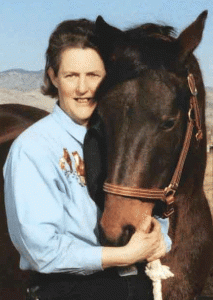 Temple Grandin, “easily the most famous female autistic woman in the world” (The Wall Street Journal, “Life Among the ‘Yakkity Yaks,’” February 20, 2010), also teaches at Colorado State University, travels world-wide lecturing, is the author of ten books, and has a Ph.D. in animal sciences. A stunning list of accomplishments for anyone, incredibly remarkable for a woman whose parents received unanimous medical advice to have her permanently institutionalized as a child due to her autism. Her mother refused to give up on her even though she did not speak until she was four. In addition to hiring a speech therapist, her mother insisted she practice proper etiquette, go to church, and interact with adults at parties. “I would be in an institution if it were not for her,” says Grandin.
Temple Grandin, “easily the most famous female autistic woman in the world” (The Wall Street Journal, “Life Among the ‘Yakkity Yaks,’” February 20, 2010), also teaches at Colorado State University, travels world-wide lecturing, is the author of ten books, and has a Ph.D. in animal sciences. A stunning list of accomplishments for anyone, incredibly remarkable for a woman whose parents received unanimous medical advice to have her permanently institutionalized as a child due to her autism. Her mother refused to give up on her even though she did not speak until she was four. In addition to hiring a speech therapist, her mother insisted she practice proper etiquette, go to church, and interact with adults at parties. “I would be in an institution if it were not for her,” says Grandin.
Grandin is well known in the field of animal sciences for having revolutionized livestock handling equipment. Today half the cattle on their way to American stomachs pass through systems she has invented. And, remarkably, she even has been honored by PETA for making the process more humane. Grandin successfully turned her weakness into a strength: she credits her autism for her unique ability to relate to cattle.
While Grandin acknowledges that 30 years of low doses of antidepressants have spared her constant panic attacks and anxiety, mostly her coping advice is simple: “It’s about hard work. Young children need 20 or 30 hours a week of one-on-one time with a committed teacher or mentor. Money, Grandin says, should not be an obstacle. If you can’t afford a professional teacher, find volunteers through your church or synagogue, she says. Parents need to teach 1950s-style social rules ‘like please and thank you, basic table manners.’… There have to be high expectations. She’s worried about the ‘handicapped mentality’ that she thinks is increasing. ‘When I see these kids with 150 IQ and their parents want to put them on Social Security [disability], it drives me nuts.’ These kids ‘will come up to the book table and start talking about ’my Aspergers.’ Why don’t you talk about becoming a chemist, or a computer programmer, or a botanist?’”
There are many ways to make a person a victim, one way is by permanently labeling him or her a victim.
Solution-oriented thinking is not a miracle cure for problems but it sure is a lot more effective than focusing primarily on the negative.
Most of the time the best way out is by some combination of hard work, intelligently directed with perseverance and discipline.
The secret to life is that there is no secret. Just practice, practice, practice.


0 Comments